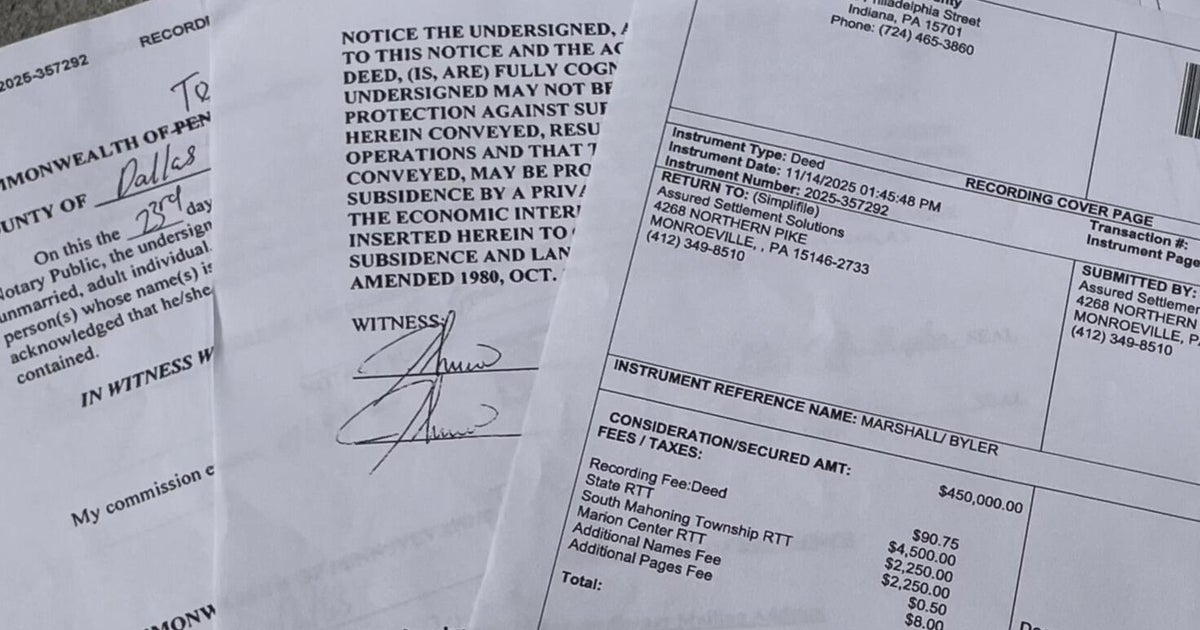Nerve-Wracking Phone Scam Targets South Florida Residents
SOUTH FLORIDA (CBSMiami) — "We got your son, we got your son and we're going to kill him," a caller screamed to Elizabeth Manger.
Her heart froze. Manger, a probation officer in Miami Gardens, has two sons and got the call while at work. With the abrasive voice still screaming at her in heavily-accented English, she ran down the hall to have her supervisor call her sons. They were safe.
"They kept saying 'how much money can you get,' getting more tense and nasty," Manger said. "I got so upset, I hung up the phone."
CBS4 news partner The Miami Herald reports this scam has been ringing South Florida phones for more than a year, although a recent wave has once again brought it to the attention of law enforcement.
The story is usually the same: a caller speaking Spanish or English with a Spanish accent says, "Your brother was in an accident and he's hurt, but he messed up my motorcycle and if you don't wire money (usually around $2,000) we're going to kill him."
The number has a 787 area code — from Puerto Rico.
The FBI is investigating patterns of phone scams, including this story that started circulating about a year ago, said Harry Rodriguez of the FBI field office in San Juan, Puerto Rico. He said there have been some arrests but couldn't comment on how many.
"Some of these calls have been made by inmates in the prison system in Puerto Rico," Rodriguez said. "We're aware of the fact that people on the outside are assisting these extortion phone calls that come from within Puerto Rico."
Phone scams are on the rise nationwide. In 2011, the Federal Trade Commission reported more than 70,000 complaints of scams related to telephone and mobile services. There were less than 37,500 phone-related complaints registered in 2010 and less than 11,000 in 2009. These complaints do not include other kinds of scams such as fraudulent sweepstakes and prizes, debt collection or internet services.
Con artists often change their stories to target different demographics. Elderly people in every state fall victim to stories about a grandchild in trouble. For years, callers pretending to be from the Nigerian Central Bank have been going after the bank accounts of small businesses worldwide. Other fraudsters claim to be calling from power companies and credit-card companies.
Florida is the only state where people have reported receiving calls from a 787 number telling the same story Manger described. She said another Miami Gardens officer got the same call. Two Miami Herald reporters were victims as well.
When phone scams are reported to local police, they are classified as either fraud or theft, so Miami-Dade police do not have specific statistics on crimes of this type, said spokesman Javier Baez.
Although increasing awareness of the brother-in-the-motorcycle-crash story has hurt its effectiveness, there are still people who fall victim and wire money out of concern for their loved ones. Police say it's next to impossible to recover money that is sent, usually overseas.
Describing the way scammers dial victims' numbers, Broward Sheriff Office spokeswoman Keyla Concepcion said, "it's hard to trace back who it is because they set it up in a way to bounce the calls." In most cases, she added, "once the transaction is completed, the money's gone."
The most common way to send money is through a wire service like Western Union or MoneyGram. A Western Union customer service representative said agents are trained to identify suspicious transactions and hold payments until the identity of the receiver can be verified. Senders trying to wire more than $700 are automatically interviewed for their own protection.
The Western Union representative said he handles about five cases of suspected fraud a week.
Florida law requires employees of banks and credit unions to report suspected financial exploitation of the elderly, but such protection doesn't cover this kind of scam committed by strangers, according to the Florida Department of Children and Families. Other states like California have similar laws that do include this kind of fraud, but only against the elderly.
This fraud protection law helped one California woman get her money back from the bank because the teller failed to report it, even though the bank employee suspected it was a scam. Jaime Levine, an attorney with Elder Law and Advocacy in San Diego, said his client did not want to be named because she has become a constant target since falling victim to the scammer's story months ago.
"It's like she's on some kind of scammer's call list," Levine said. "Once you pay anything in these scams, they go after you."
The California woman withdrew $900 to send to someone in Canada claiming to be her grandson needing money for bail. After paying once, the scammers called back pretending to be a lawyer. He said he needed $2,000 to help her grandson. She sent three payments before the bank refused to let her withdraw more money.
The best way to avoid falling victim to phone scams is to "do your homework," Concepcion said.
"Our main message is not to just take out your credit card or give your bank account number," she said. "Get a phone number from the caller in case it is legitimate, but make a couple of phone calls to your loved ones to find out if it's even possible that this could be true. The best protection is just a matter of being aware that these scams are out there."
(©2012 CBS Local Media, a division of CBS Radio Inc. All rights reserved. This material may not be published, broadcast, rewritten, or redistributed. CBS4 news partner The Miami Herald contributed material for this report.)







